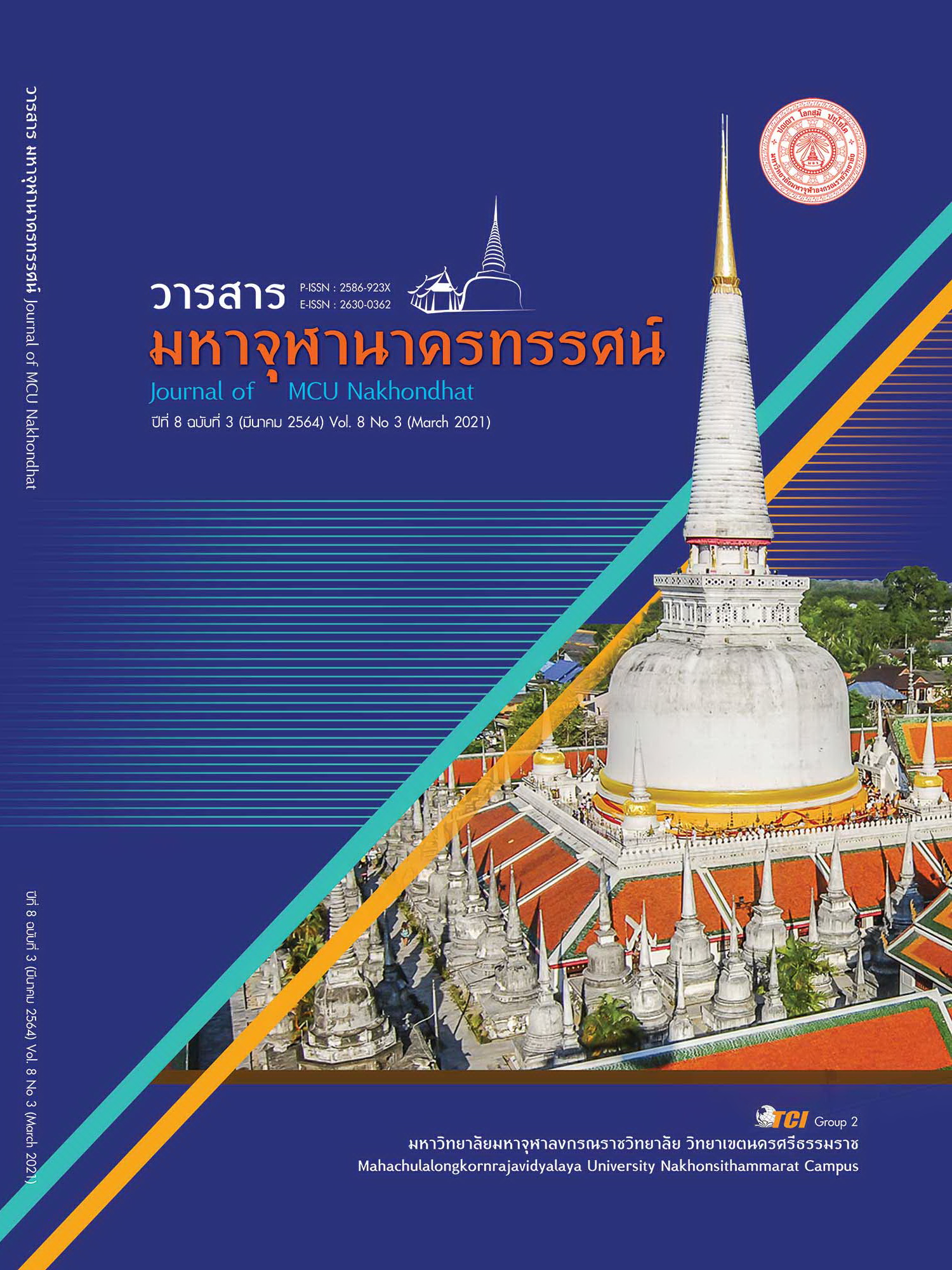SHORT - TERM CAREER BUILDING TRAINING BY A PARTICIPATORY LEARNING PROCESS FOR SECONDARY SCHOOL STUDENT IND THE PROVINCE OF NAKHON SI THAMMARAT
Main Article Content
Abstract
The objectives of this research article were to 1) To study the needs of vocational training, career building training, short - term courses of secondary education students. In Nakhon Si Thammarat Province and 2) to provide academic services Short - term career building training It is a participatory learning process. The samples used in this research were 1) Chang Klang Prachanukul School 2) La - ai Pittayanusorn School 3) Chawang School, Ratchadapisek, 159 people. Research tools consisted of short - term vocational training courses, pre - and post - training test notes. And the satisfaction assessment form for short - term career building training The statistics used for data analysis were percentage, mean, standard deviation. T - value test The research process is divided into 3 phases: Phase 1, to exchange and learn about career building training. Phase 2 consists of data analysis activities for preparing short - term career building training courses, and Phase 3 conducting trial courses and Stage night activities, short - term career building training courses The analysis results showed that Target group needs to develop professional skills, short - term career building training courses. And effective courses that can be used to develop professional skills, short - term career building training courses The results of the training were found that the students had passed the exam score of 80% after the training was passed. When comparing the score, the score after training was higher than the score before the training. Significantly, at .01, the satisfaction of the professional skills development short - term career building training program was found that the participants of the short - term career building training program Are satisfied at the highest level.
Article Details
References
ไชยา ภาวะบุตร. (2548). ความสัมพันธ์ระหว่างการบริหารจัดการแหล่งเรียนรู้กับคุณลักษณะการเป็นบุคคลแห่งการเรียนรู้ของนักเรียนในโรงเรียนมัธยมศึกษา สังกัดเขตพื้นที่การศึกษาสกลนคร. วารสารบัณฑิตศึกษามหาวิทยาลัยราชภัฏสกลนคร, 3(9), 69-78.
ธีระ รุญเจริญ และวาสนา ศรีไพโรจน์. (2554). กลยุทธ์การพัฒนาความเป็นบุคคลแห่งการเรียนรู้. กรุงเทพมหานคร: ข้าวฟ่าง.
ปาริชาติบัวเจริญ และคณะ. (2559). การศึกษาปัจจัยที่มีส่งผลต่อความคิดสร้างสรรค์ของนักศึกษาระดับปริญญาตรีคณะวิศวกรรมศาสตร์มหาวิทยาลัยเทคโนโลยีราชมงคลล้านนาเชียงใหม่. วารสารศึกษาศาสตร์ มมร, 7(1), 241-254.
ราตรี พัฒนรังสรรค์. (2554). พฤติกรรมมนุษย์กับการพัฒนาตน. กรุงเทพมหานคร: มหาวิทยาลัยราชภัฏจันทรเกษม.
วิจารณ์ พานิช. (2555). ศตวรรษที่ 21. เรียกใช้เมื่อ 8 มกราคม 2564 จาก https://sites.google.com/site/ppvilawan21/thaksa-haeng-stwrrs-thi-21
วิชัย วงษ์ใหญ่. (2554). นวัตกรรมหลักสูตรและการเรียนรู้สู่ความเป็นพลเมือง. กรุงเทพมหานคร: บริษัท อาร์ แอนด์ ปริ้นท์ จำกัด.
Brown, H. (2001). Teaching by principles. (2nd ed.). E nglewood Cliffs: Prentice Hall.
Gardner, H. (2006). Five Minds for the Future. Boston: Harward Business School Press.
Krejcie, R. V. & Morgan, D. W. (1970). Determining Sample Size for Research Activities. Educational and Psychological Measurement, 30(3), 607-610.
Rovinelli, R. J. & Hambleton, R. K. (1977). On the use of content specialists in the assessment of criterion - referenced test item validity. Dutch Journal of Educational Research, 1977(2), 49-60.


